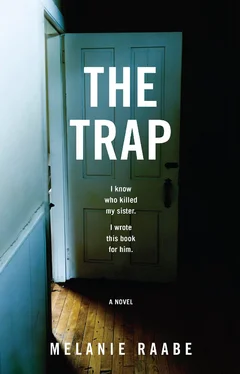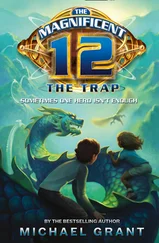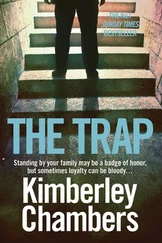I pull myself together.
“Okay,” I say. “We’ll do it now.”
Once again, the therapist removes the lid and places the jar on its side. The spider begins to move at a speed that terrifies me. I force myself to keep looking at it, even when the therapist lets it crawl onto his hand. I suppress the urge to jump up and run away, and I feel a drop or two of cold sweat running down my spine. I force myself to remain seated and watch. The spider comes to rest on the man’s hand — a nightmare of legs and fuzz and repulsiveness.
Once again, I try to apply what I have learned over the past weeks. I focus my attention on my body and realize what an unnatural posture I have adopted. My torso is inclined as far to the left as it can go, and I’m cowering in the far corner of the sofa. I ask myself whether this is the way I want to be: like a rabbit in front of a snake. Whether I can afford to act like this, either now or in the future.
I sit up straight, throw back my shoulders, lift up my chin. I reach out my hand and give the man with the spider a nod. My fingers are trembling, but I do not withdraw them.
“Are you okay?” the therapist asks.
I nod, letting all my energy flow into my hand, which I hold still.
“All right then,” says the therapist and brings his hand nearer to mine. For a moment, the creature squats there, motionless. I watch it, with its thick, hairy legs and its round body — that, too, is hairy but with a small bald spot. The legs are striped: black and tan, black and tan — each with an orange dot in the middle. I only notice that now. The spider sits there, quite still on the man’s hand, and I tell myself I can do it.
Then it starts to move. Everything about it looks wrong. My stomach rebels. Specks of light dance before my eyes, but I keep still, and the creature crawls onto my hand. The first tentative movement of its legs on my palm throws me into panic, but I remain motionless. The bird-eating spider crawls onto my hand. I feel its weight, the touch of its legs, its body brushing my skin. For a terrible moment I think it’s going to crawl up my arm and across my shoulder to my neck and face, but it stops on my hand. It squats there, shifting its legs. I stare at it. This isn’t a nightmare, I think; this is real life, it’s happening right now and you can take it. This is your fear; this is what your fear feels like, and you can take it. I feel dizzy; I’d like to faint, but I don’t. Instead I sit there with a bird-eating spider on my hand. It has stopped moving. My fear is a dark well that I have fallen into. I’m suspended vertically in the water. I try to touch the bottom with my toes, but I can’t.
“Shall I take it off you?” the therapist asks, startling me out of my trance.
I can only nod again. Carefully, he picks up the creature in the hollow of his hand and stows it back in the container that he carries in a kind of sports bag.
I stare at my hand. I feel the throb of my pulse, the furry feeling on my tongue, my tense muscles. My T-shirt is clinging to me, drenched in sweat. My face contracts as if I were about to cry, but as so often in the past years, no tears come and I cry in dry, painful sobs.
I’ve made it.
I’m sitting in my favorite armchair, looking out into the darkness and waiting for the sun to rise. The edge of the woods lies before me. I would love to see an animal in the cool light of the stars, but nothing stirs. Only an indefatigable owl gives a hoot every now and then.
A clear sky arches over the treetops. Who knows how many stars are really up there. Stars only have one means of telling us that they no longer exist: they stop shining. But if a star is a thousand light-years away and stopped shining yesterday, then it would, in theory, be a thousand years before we found out on Earth.
Nothing is certain.
I curl up in my armchair and try to nap. An interesting day lies behind me, and a hardworking night. Tomorrow I have an important talk with an expert and want to be prepared.
It’s soon clear to me that I’m not going to sleep. I try to relax in my armchair, to build up a bit of energy even without sleeping. My gaze rests on the meadow behind the house, and the glistening shore of the lake. I sit there like that for a long time.
At first I think I’m imagining things when the stars seem to shine paler and the sky begins to change color. But then I hear the birds twittering through the window; they start up as if an invisible conductor had signaled to them with a raised baton. Then I know the sun is rising. To begin with, it is a mere gleaming streak behind the trees, but soon it starts to climb, vast and blazing.
It is a miracle. I remind myself that I am on a tiny planet that is moving at an insane speed through a boundless universe, never tiring of its flight around the sun, and I think to myself: it’s crazy. That we exist at all, that the Earth exists and the sun and the stars, and that I can sit here and see and feel all this. It’s incredible; it’s a miracle. If this is possible, anything’s possible.
The moment passes. A clear morning lies before me. I glance at the time. It will be another few hours before the man arrives to teach me about interrogation techniques.
I get up, make myself tea, fetch my laptop and sit down at the kitchen table. I have another quick look at the article I’d studied the night before. When Bukowski comes lumbering up to me, I let him out and watch him go to meet the day.
When the time comes, the sun has long since passed its zenith. I’m sitting in the kitchen with Charlotte, who’s brought around the week’s shopping.
“Would you mind taking the dog out again before you knock off?” I ask.
“Sure, no problem.”
Charlotte knows I like to be left alone with my experts; she knows that’s the only reason I’m sending her out again with Bukowski. I look out of the window and watch the gardener cutting the grass. He raises a hand in greeting when he sees me. I wave back and close the window in the room where I plan to receive Dr. Christensen.
Less than half an hour later, I’m sitting across from him. The blond German-American has icy blue eyes. His handshake is firm and I can only withstand his gaze because I’ve put in a substantial amount of practice over the past weeks. Charlotte has been gone awhile; dusk is falling. I arranged this private consultation some weeks ago and had to cough up a great deal of money to get Christensen to come to my house. He is an expert in wringing confessions from criminals. His speciality is the notorious Reid technique, a questioning method not officially permitted in Germany, which employs a range of psychological tools and tricks to make the suspect break down.
Maybe it’s naive to hope that Lenzen will confess.
But having got so far, I want to be as well prepared as possible. I must somehow get him to talk to me beyond the framework of the interview — ask him questions, get him to tie himself up in contradictions, provoke him if necessary, and somehow pin him down. If there’s anyone who can help me find out how to impose my will on a criminal and talk him into confessing, it’s Dr. Arthur Christensen.
And in case Lenzen is a tough nut to crack, I always have something else up my sleeve…
When Christensen realized that I wasn’t interested in his theoretical explanations (which you can easily read up on in the specialist literature on the subject) but in quite concrete information on how to break a culprit and force him to confess — that is to say, how it works in practice and what it feels like — he seemed peeved. But the large sum of money I was prepared to spend, combined with his realization that I am not a criminal mastermind but merely a sick, weak woman novelist, persuaded him to demonstrate his skills to me.
Читать дальше












